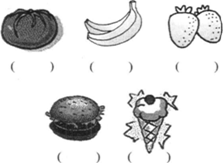网址:http://m.1010jiajiao.com/timu3_id_2390767[举报]
I'm Kitty. Today the clothes at Xingxing Clothes Store are on sale. So I want to buy some clothes for my grandparents, my parents, and myself. Let me have a look. This yellow sweater is at a very good price--only 15 dollars. And it's OK for my grandfather. For my grandmother, I want to buy a pair of black shoes. It's very comfortable (舒适的). How about this blue T-shirt? Oh, my father can wear it to play basketball. And-there are many socks in green, yellow, black, blue, red, and white. I know my mother likes red very much, so I will buy these red ones. I need pants, so I will take these blue ones.
【小题1】The is only 15 dollars.
【小题2】Kitty wants to buy for her grandmother.
【小题3】The blue T-shirt is for her
【小题4】Kitty's mother likes red
【小题5】Kitty needs , so she will buy some. 查看习题详情和答案>>
| |||||
Does technology influence the purity of Chinese language? Yes!
Many Chinese use messenger tools such as MSN or QQ, listen to music on MP3 players and blog on the Internet using ADSL ,but most people don’t know the Chinese meanings of the abbreviations, as many English letters have become part of the local lexicon(专门词汇). some parents are so crazy about English letters that a couple tried to name their baby "@", they say the character used in email addresses reflects their love for the child.
While the "@" is obviously familiar to Chinese e-mail users, they often use the English word "at" to pronounce it , which sounds like ai ta, or "love him", to Putonghua speakers.
“Nowadays, more and more English abbreviations are being used in Chinese, making them an important part of the modern language," said Hou Min, a professor at Communication University of China. "The abbreviations are very popular because they can be used easily," Hou said. "As more Chinese people learn foreign languages, especially English, in recent years, using abbreviations has become a trend(趋势)among some educated people," she said.
Some language scholars fear such usage will influence the purity of Chinese and cause confusion(混乱) in communication.
【小题1】Which of the following is Not True according to the passage?
| A.Only a few people know the Chinese meanings of the abbreviations. |
| B.People often use the English word " love him " to pronounce"@". |
| C.Many English letters are popular and have become part of the local lexicon. |
| D.Using abbreviations has become a trend among educated people in recent years. |
| A.Because some parents feel "@"is very interesting. |
| B.Because some parents think "@"is a lucky word. |
| C.Because some parents want to show their love. |
| D.Because it is easy for children to write"@". |
| A.More and more Chinese abbreviations are being used in English |
| B.Chinese students can use Chinese in English correctly. |
| C.Many Chinese use messenger tools such as MSN or QQ, listen to music on MP3 players. |
| D.More and more English abbreviations are being used in Chinese |
| A.English abbreviations isn’t used in Chinese widely. |
| B.Technology influences the purity of Chinese language. |
| C.Some parents think it important to name their baby "@". |
| D.Using abbreviations has become a trend among some educated people. |
连词成句(共5小题,每小题1分,计5分)
根据所给单词完成句子要求符合语法,语句通顺,大小写正确,单词不得重复使用,标点已给出。(注意90题的变化呦!)
1.feel, me, words, made, his, embarrassed? ( . )
2.was, boy, that, excited, so, speak, the, couldn’t, he? ( . )
3.problem, how, your, do, you, with, deal? ( ? )
4.the, of, players, the, is, safety, important ( . )
5.what, you, most, the, think, do, invention, useful, be ( ? )
查看习题详情和答案>>
阅读理解
阅读下面的对话,然后完成后面的练习.
Alice: Good morning, Susan.
Susan: Good morning, Alice.
Alice: Can I come in?
Susan: Sure(当然), please.
Alice: Oh, is this your room?
Susan: No, it’s my brother’s room.
Alice: Is this a television(电视) on the table?
Susan: No, it isn’t. It’s a computer.
Alice: I see. What’s this in English?
Susan: It’s a map.
Alice: How do you spell it?
Susan: M-A-P, map.
Alice: Is this a watch?
Susan: Yes, it is. it’s my watch,
Alice: It’s very nice.
1.It is___________ room.
A. Susan’s brothers’ B. Alice’s brother’s C. Susan’s sister’s
2. The_________ is on the table.
A. computer B. television C. watch
3. _________ can spell “map”
A. Susan B. Alice C. Alice’s brother
4. A___________ is not in the room.
A. watch B. desk C. table
5. Alice thinks(认为) the watch is__________.
A. nice B. not good C. not OK
查看习题详情和答案>>















